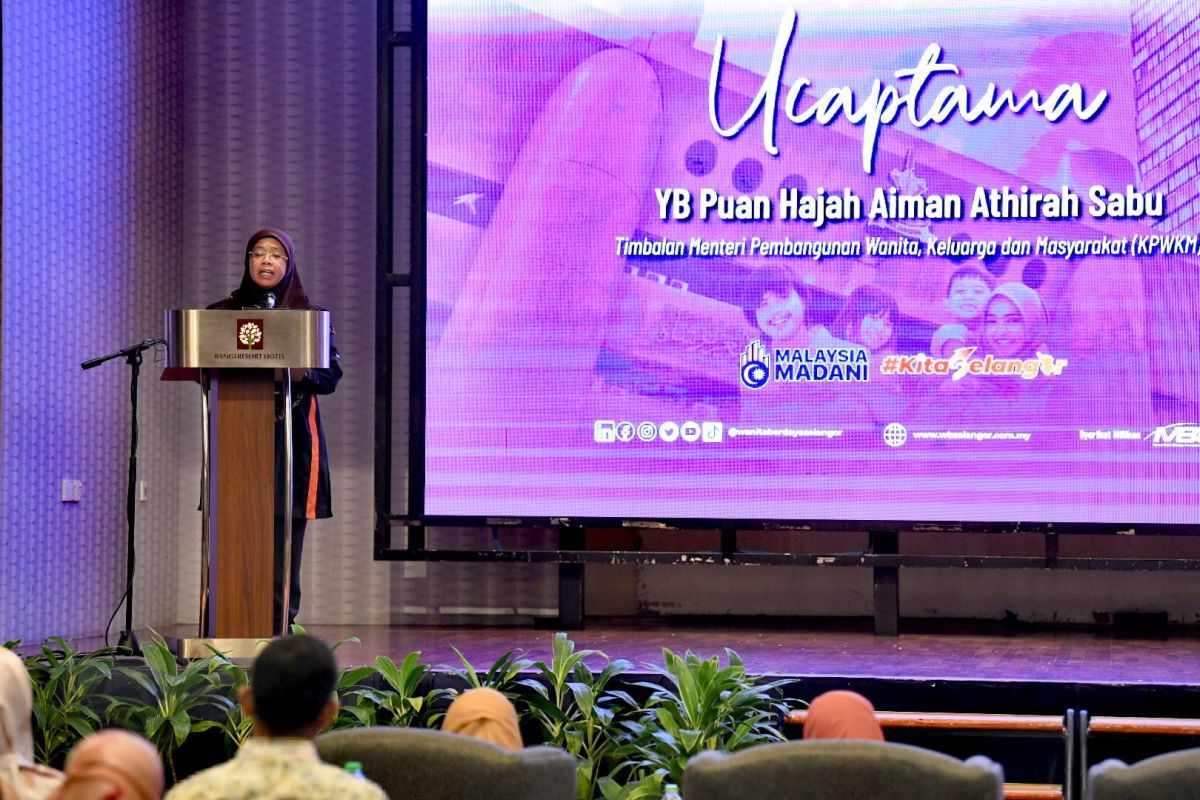BANGI, Sept 23 – The role of caregiver in a family is often considered the natural responsibility of women, said deputy minister of Women, Family and Community Development (KPWKM), Aiman Athirah Sabu, who pointed out that although the care economy was being actively developed in Malaysia, it is still not formally recognised.
Aiman who said this during her keynote address at the inaugural Selangor Family Seminar 2023 (Seminar Keluarga Negeri Selangor 2023), which was held in Bangi last Thursday, cited a study conducted by the International Labour Organisation (ILO), which found that all over the world, women undertake 76.4 per cent of unpaid care work, spending on average four hours and 32 minutes a day on it, compared to men who only spend an hour and 24 minutes on unpaid care work.
The seminar aims to obtain input, recommendations, and best practices from stakeholders to develop the wellbeing of families in Selangor, which has been impacted by the Covid-19 pandemic.
Aside from unpaid care and domestic work — which has contributed to the gender pay gap and work-life imbalance among parents — the seminar also aimed to address issues related to employment, reduced income, and rising costs of expenses.

Selangor ranked 13 out of the 17 states including all three Federal Territories with a score of 7.68 out of 10 in the Malaysian Family Well-Being Index 2019. Among the main issues that jeopardise the state’s score index are parents who are too busy with work, said Anfaal Saari, permanent chairwoman of the Empowering Women and Families, Social Welfare and Care Economy committee for Selangor.
Despite family being the most important social institution in society, the country’s rapid economic and social development has had an impact on the wellbeing of families, Anfaal said in her welcome address at the event.
“A study by the Merdeka Centre on parents in Selangor in 2021 highlighted the challenges they faced which include lack of time and attention given to children, financial problems and insufficient savings.
“Furthermore, our society is currently facing the problem of the ‘sandwich generation’, which is the generation that has to undertake the dual responsibility of taking care of ageing parents and also children.
“This situation is bound to impact mental health, quality of life and family wellbeing,” Anfaal said, adding that she believes the issues she mentioned are only the tip of the iceberg of the many challenges ahead to strengthen the family institution.
In her keynote address, Aiman said that Covid-19 has also had an impact on how children and teenagers used technology.
“The rapid adoption of technology today has little by little eroded the family values that should be carried on from one generation to the next,” she said, citing a study conducted by the Malaysian Communications and Multimedia Commission (MCMC) in 2020, which found that use of internet among five to seventeen-year-olds increased from 18.4 per cent in 2016 to 47 per cent in 2020.
In response to this, KPWKM through the National Population and Family Development Board (LPPKN) developed a Digital Parenting module as a way to help parents guide their children in the use of technology. “However, when the Covid-19 pandemic hit in 2020 and 2021, it had a big impact on the use of technology,” Aiman said.
“How can it not? We transitioned to a new normal, physical encounters were limited, children’s education was conducted online and many others were impacted including businesses.
“Nonetheless, although the technology has become indispensable to daily living, it still poses a threat to children who are exposed to its negative use when they are online,” added the deputy minister.












